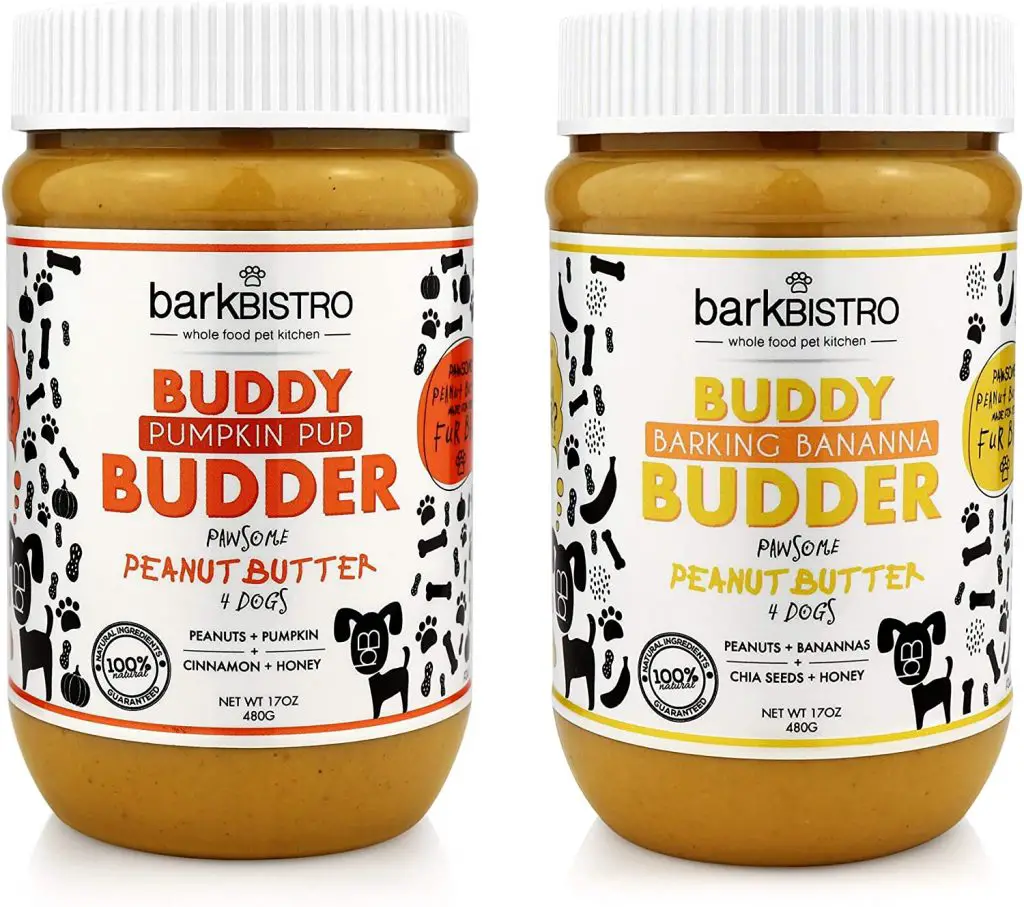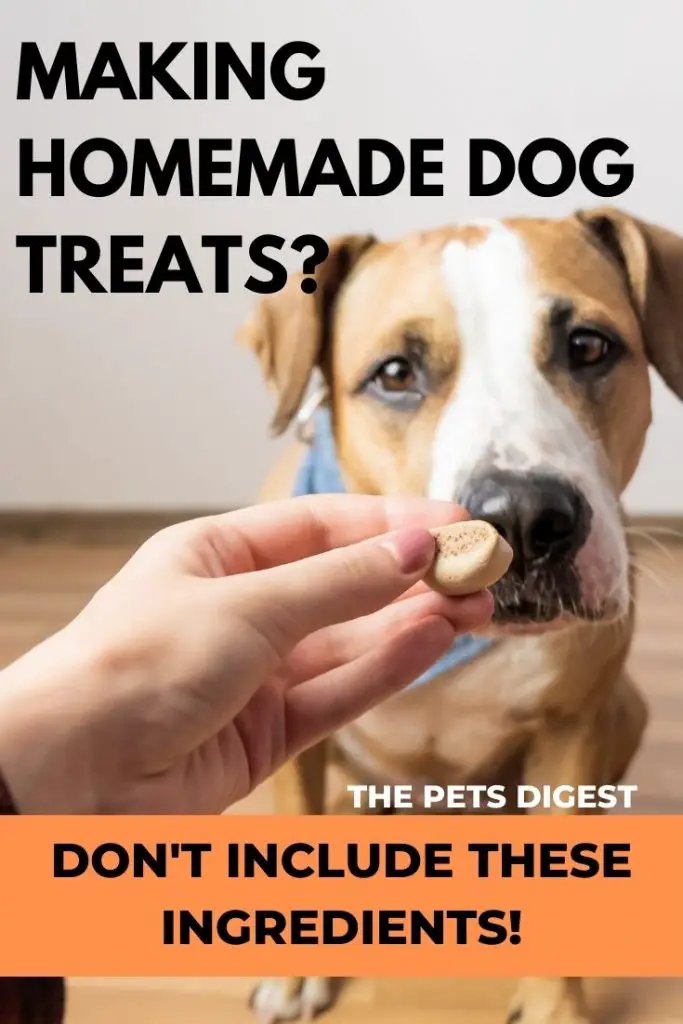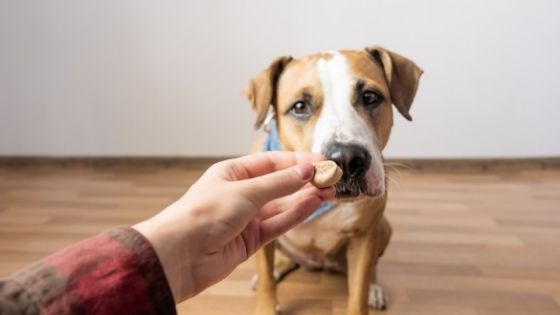While many times we use items around the house to make treats for our dogs, there are some ingredients you should be very aware of. Many times, these ingredients that are safe to us can cause severe harm to our fur babies.
Peanut Butter
Not all peanut butters are created equal and if you are making your dog homemade treats with nut butters make sure to avoid one’s that includes xylitol.
Xylitol is a sugar alcohol used as a sweetener and it is over 100 times more toxic than chocolate for dogs! While xylitol does not stimulate the release of insulin from the pancreas in humans, it can wreak havoc on your pet’s body.
It causes the dog’s body to release insulin resulting in a blood sugar drop or severe hypoglycemia which can last for about 6-12 hours. The detrimental effects of xylitol can occur as quickly as within 30 minutes of ingestion.
Some of the symptoms of xylitol poisoning in dogs are
- Hypoglycemia
- vomiting
- vomiting
- lethargy (or being extremely tired)
- Seizures
- weakness
- coma
- liver failure (in severe cases)
Unfortunately, there is no antidote for xylitol poisoning in animals, so you are seeking a safe peanut butter buy one specifically formulated for dogs, that way you can rest easy that your dog will be safe when eating your homemade treats!

Vanilla
While vanilla itself isn’t toxic for dogs, vanilla extract with alcohol is! If you are making dog treats recipes that call for vanilla extract make sure you use an all-natural, non-alcoholic vanilla extract that has glycerin as a base.
Some signs of toxicity from the alcohol in vanilla extract include:
- Vomiting
- Diarrhea
- Problems coordinating movement
- Problems breathing
Gelatin
Gelatin itself is not bad for your dog in fact it’s actually pretty good for them. But if it contains artificial sweeteners like xylitol or colors it can really do harm to your pup so make sure the gelatin that you choose has none of these ingredients.
Chocolate
While many pet owners know not to feed their dogs chocolate, some are still in the dark about the detrimental and sometimes deadly effects it can have on your pet!
Depending on the size of your dog and the type of chocolate, large quantities can kill. This is due to the theobromine in chocolate. While humans can easily metabolize theobromine, dogs process it much more slowly and it continues to build up in their system until it reaches toxic levels.
Signs of chocolate poisoning in dogs usually appear within 6-12 hours of ingestion and include:
- Vomiting
- Restlessness
- Diarrhea
- Incorrdinated gait
- Seizures
- Hyperactivity
- Rapid Breathing
One of the first things your vet will do is induce vomiting in your pet to try and get the chocolate out of your pet’s system as soon as possible. This is best done if eaten within the last 30 minutes.
If you are seeking an alternative to chocolate for your dogs try unsweetened carob chips. These chips add a cocoa flavor without the harmful effects of chocolate, of course, you do still want to use them in moderation and speak to your vet first about how much to add.
Depending on the size of your dog and the type of chocolate, large quantities can kill, but many times ingestion just causes mild stomach upset.
This is due to the theobromine in chocolate. While humans can easily metabolize theobromine, dogs process it much more slowly and it continues to build up in their system until it reaches toxic levels.

Seasonings
While we may love for our foods to be extra seasoned it really isn’t necessary for your dog. Trust me, they will scarf down whatever you make for them, well at least my dog will.
But if you have a picker pet and want to try to spice up their treats make sure you aren’t adding spices that can cause severe damage to their organs like onion, garlic powder, salt, nutmeg, and cocoa powder!
These ingredients can cause symptoms like:
- Vomiting
- Diarrhea
- Organ failure
- Red blood cell damage (onions)
- Dehydration (salt)
There are some seasonings or herbs that are safe for dogs like ginger, parsley, and turmeric. In fact I add a little turmeric to my dogs food every now and then.
Raisins
Grapes are extremely toxic for dogs and since raisins are basically dried grapes make sure to avoid adding both to any treats you make for your dog. This also includes sultanas and currents.
Dog’s can get severe, acute kidney failure from eating raisins, and some of the signs of poisoning you may notice are:
- Vomiting (usually within 24 hours)
- Diarrhea
- Stomach pain
- Lethargy
Make sure to stay away from any products that contain grapes as well, including grape juice, raising paste, raisin bread, and wine.

Nuts
Specifically, black walnuts and macadamia nuts
Macadamia nuts can cause weakness in the back legs, vomiting, and diarrhea. Usually, the symptoms are mild and manageable at home, but in severe cases, you will have to take your dog into the vet for treatment. However, if your dog does eat macadamia nuts you should always contact your veterinarian.
It isn’t known what chemical in macadamia nuts causes issues in dogs but some signs of macadamia nut poisoning include
- Vomiting
- Pancreatitis – they are very fatty
- Seizures
- Lack of appetite
- Diarrhea
- Inability to use hind legs
- Stomach pain
While not toxic to cats, black walnuts can be extremely toxic to dogs and horses. Fortunately, it isn’t the nut itself that is harmful, but a common mold that grows on black walnuts. This also holds true for pecans, and, pistachios.
Personally, I opt to avoid nuts in my dog treats completely, and while many times, you won’t have issues when feeding your dog nuts listed above, but I would definitely err on the side of caution and opt for peanuts or cashews. They are both said to be safe in small quantities, but they are also very high in fat and should not be given regularly.

Fat
If you are making your treats at home and use meats like chicken, turkey, or beef make sure to remove all of the skin as this is the fattiest part of the meat.
You also want to boil out any excess fat. Fat can cause acute pancreatitis in dogs which can be life threatining.
Signs of too much fat in your dog’s treat include:
- Vomiting
- Diarrhea (sometimes with blood)
- Lethargy
- Stomach Pain
If you suspect that your pet has eaten any of these products, please contact your veterinarian or Pet Poison (800-213-6680).



























































































































I was in a pet store earlier today and was surprised to see peanut butter. I just read your post and appreciate you educating me on its use.